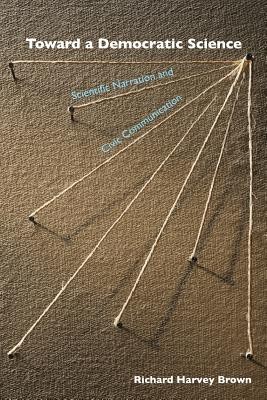
- We will send in 10–14 business days.
- Author: Richard Harvey Brown
- Publisher: Yale University Press
- ISBN-10: 0300207530
- ISBN-13: 9780300207538
- Format: 15.6 x 23.4 x 1.7 cm, softcover
- Language: English
- SAVE -10% with code: EXTRA
Reviews
Description
In this important book, a leading authority in the field of social theory and communication shows how scientific practice is a rhetorical and narrative activity, a story well told. Richard Harvey Brown develops the idea of science as narration, casts various scientific disciplines as literary genres, and argues that expert knowledge of any kind is a form of power. He then explains how a narrative view of science can help integrate science within a democratic civic discourse. Brown shows why social science knowledge is as much a rhetorical enterprise as is the social reality that it describes. He construes laboratory science, physics, ethnography, sociology, philosophy, and astronomy as genres, narratives, and other rhetorical practices, and thereby portrays science as a special kind of narrative discourse that generates theories and shapes their validity and significance. He next focuses on the political dimensions of science, including the politics of psychology in the United States, showing how power and knowledge shape, limit, and infuse each other. Brown argues that this linguistically and socially constructed character of knowledge does not undermine its truth value but rather reaffirms the moral status and political responsibilities of its practitioners. In one important chapter, written with Robert Brulle, he explores the movement for environmental justice in the United States, showing how ordinary people can use science as part of a larger civic narration. Brown concludes by discussing how the rationality of science can be preserved even as it is subsumed within a rational and moral civic discourse.
EXTRA 10 % discount with code: EXTRA
The promotion ends in 16d.20:00:17
The discount code is valid when purchasing from 10 €. Discounts do not stack.
- Author: Richard Harvey Brown
- Publisher: Yale University Press
- ISBN-10: 0300207530
- ISBN-13: 9780300207538
- Format: 15.6 x 23.4 x 1.7 cm, softcover
- Language: English English
In this important book, a leading authority in the field of social theory and communication shows how scientific practice is a rhetorical and narrative activity, a story well told. Richard Harvey Brown develops the idea of science as narration, casts various scientific disciplines as literary genres, and argues that expert knowledge of any kind is a form of power. He then explains how a narrative view of science can help integrate science within a democratic civic discourse. Brown shows why social science knowledge is as much a rhetorical enterprise as is the social reality that it describes. He construes laboratory science, physics, ethnography, sociology, philosophy, and astronomy as genres, narratives, and other rhetorical practices, and thereby portrays science as a special kind of narrative discourse that generates theories and shapes their validity and significance. He next focuses on the political dimensions of science, including the politics of psychology in the United States, showing how power and knowledge shape, limit, and infuse each other. Brown argues that this linguistically and socially constructed character of knowledge does not undermine its truth value but rather reaffirms the moral status and political responsibilities of its practitioners. In one important chapter, written with Robert Brulle, he explores the movement for environmental justice in the United States, showing how ordinary people can use science as part of a larger civic narration. Brown concludes by discussing how the rationality of science can be preserved even as it is subsumed within a rational and moral civic discourse.


Reviews